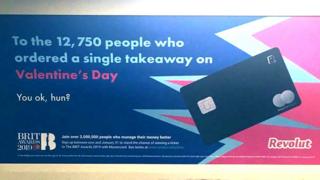Revolut: Watchdog mulls ‘single-shaming’ banking ad
 Image copyright
Image copyright
Iona Bain
A financial technology company whose “single-shaming” advertising campaign drew protests is facing scrutiny from the City watchdog over the issue.
Revolut, which launched in 2015, bills itself as an alternative to banks and offers app-based current accounts.
But it sparked complaints with a “spoof” advert addressed to people who ordered a takeaway meal for one on Valentine’s Day last year.
The complaints have now been forwarded to the Financial Conduct Authority.
Revolut has apologised for the advert, described by critics as “intrusive” and “tone-deaf”, and said it did not mean to poke fun.
It has also admitted that the figures in its campaign were fictitious and should have been labelled as such.
After the issue was highlighted on Twitter, several people complained to the Advertising Standards Authority (ASA) about the advert.
But the ASA decided that the issue was outside its scope, since it found the advert did not breach its codes.
However, it added: “As the complaint touches on the potential misleading financial services provided by the advertiser, we will be referring the matter to the Financial Conduct Authority, whose remit this would fall under.”
The ASA said complainants could rest assured that the FCA would “take any necessary action”.
Financial commentator Iona Bain, who was among the first people to draw attention to the advert and who was among the complainants to the ASA, said she was glad that the matter was being taken seriously.
Image copyright
Iona Bain
Iona Bain is founder of the Young Money Blog
Ms Bain, founder of the Young Money Blog, told the BBC that there was a recognition that the advert was possibly misleading about the financial services that Revolut provided.
She objected to the advert for a number of reasons, including the way that it played on people’s concerns about improper use of their data and whether their financial activity was private.
She added: “It’s not just the crass and tacky tone of the ad, but also the confusion about what banks do with your data.”
Revolut offers a current account service which allows people to make and receive payments, withdraw money from cash machines and transfer money abroad.
It was not a bank when it started, but it announced in December that it had been granted an EU banking licence by the European Central Bank. It still aims to acquire a full UK banking licence.
It has already attained the status of a tech “unicorn” – a term used to describe private start-ups valued at more than $1bn (£740m).
The BBC has approached Revolut for a comment on the latest developments, but no-one was available to respond.




